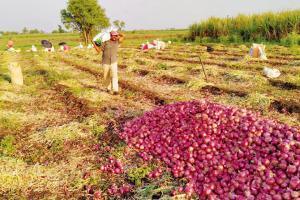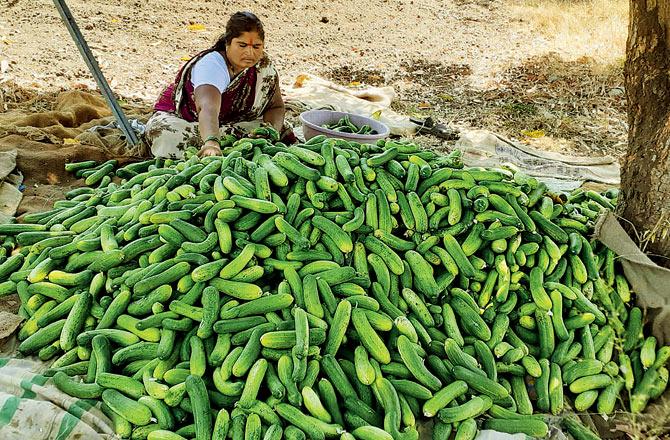Even those who've managed to sell some of their produce, are running in losses.

Tonnes of onions and cucumbers are rotting in farms at Junnar, as farmers haven't been able to sell their produce because their supply chains to crucial markets have been cut off
Dairy and vegetable farmers from the Junnar district of Maharashtra have been adversely impacted after their daily supply chain to Pune and Navi Mumbai was cut off, following the national lockdown. Thousands of kilos worth of fresh vegetables and fruits are rotting in their farm or being dumped in the open, as several farmers haven't been able to transport them to key markets in the cities. Even those who've managed to sell some of their produce, are running in losses.
The MMR region is already witnessing a steep increase in the prices of vegetables and fruits since the lockdown began on March 26. However, farmers from Junnar are selling their vegetables at dirt-cheap rates. "Cucumber is being sold at R5 per kilo, onion from R10 to R15, and cabbage and cauliflower per piece for R10. We have not been able to recover our production cost, let alone make any profit," said Dr Datta Khomane, a farmer and veterinary doctor in Junnar.
ADVERTISEMENT

Junnar taluka, situated over 240 km from Mumbai, has 6,000 residents spread across 183 villages. The three villagers who tested positive from Dingore village, had returned to Junnar from Mumbai after the lockdown was imposed. Locals have been living on the edge since then. Nearly 650 villagers, who worked in Mumbai or Pune have returned to the taluka, and are currently under home quarantine, said another farmer Amol Korde, whose wife Pushpa is the sarpanch of Bori Budhuruk village.
Most of the villagers do not sell their produce at the APMC Market in Vashi, as they do not find it profitable. They have instead setup their own vegetable and fruit outlets in Pune, Kharghar, and Mumbai, and their produce is daily transported from their farms to these cities. Post the lockdown, business has come to a halt. "We have tonnes of vegetables and fruits [onions, cucumbers, brinjal, tomatoes, radish, cauliflower, cabbage, beetroot, papaya and pomegranate] lying in the village," said farmer Ravindra Jadhav. Jadhav had taken two acres of land for cultivation purpose on hire basis, few years ago. He later took a loan from a cooperative bank to set up pipelines to irrigate the farm. "I pay interest of almost 13 per cent, but today I incur a daily loss of R10,000. If this lockdown continues, we farmers will be in grave financial trouble," he said.
Amol Korde, another local farmer, said, "We do not have any cold storage facilities here, and the day-time temperature at present is around 38 degrees; this has reduced the shelf life of our produce. We have no choice, but to either distribute the vegetables free of cost to the villagers or dump them. These are perishable items and need a market, or else it is a loss for us."
Last year, the region faced a drought, which destroyed their kharif crops. Unseasonal torrential downpour in October-November led to further losses during the harvest season. "The farmers in Maharashtra and other parts of India, are going through tough times. How long can we continue to depend on government aid?" asked
Dr Khomane.
According to Dr Khomane, Junnar also produces 2 to 3 lakh litres of cow and buffalo milk daily, which was being sold by farmers to large milk brands at a price of R32 to R35 per litre. After the lockdown, milk brands have reduced their purchase price to R28 to R30. "This may come down further, in the coming days," he said.
Many farmers engaged in diary, had taken loans from banks to buy cows and buffaloes, which cost anywhere between R75,000 to R1 lakh. "But their cattle, which gives 28 litres of milk per day, has now become a headache for them. They have no idea how to cover their costs," Dr Khomane said.
Direct home delivery soon?
Farmers in Junnar are now discussing plans to directly deliver their produce to urban households. "These times have made us think about revolutionary ideas. We will be building our technology, packaging and transport facilities, so that we can reach our customers through mobile networking, and deliver our produce directly at least twice or thrice a week," said Dr Khomane. He added,
Catch up on all the latest Crime, National, International and Hatke news here. Also download the new mid-day Android and iOS apps to get latest updates
"We will be selling our goods at competitive prices. Farmers are not good at marketing, but we are working on that. Consumers can be assured good quality produce."
 Subscribe today by clicking the link and stay updated with the latest news!" Click here!
Subscribe today by clicking the link and stay updated with the latest news!" Click here!







